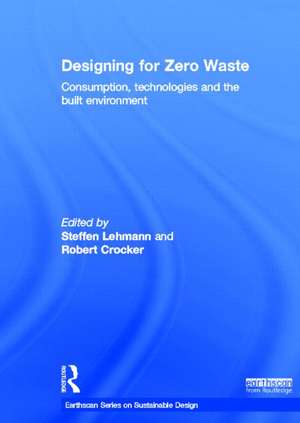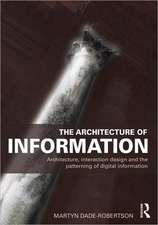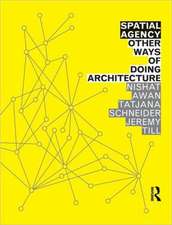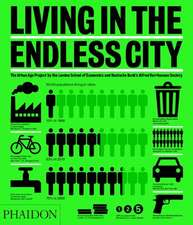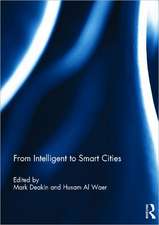Designing for Zero Waste: Consumption, Technologies and the Built Environment: Earthscan Series on Sustainable Design
Editat de Steffen Lehmann, Robert Crockeren Limba Engleză Hardback – 7 dec 2011
| Toate formatele și edițiile | Preț | Express |
|---|---|---|
| Paperback (1) | 360.48 lei 6-8 săpt. | |
| Taylor & Francis – 7 dec 2011 | 360.48 lei 6-8 săpt. | |
| Hardback (1) | 932.58 lei 6-8 săpt. | |
| Taylor & Francis – 7 dec 2011 | 932.58 lei 6-8 săpt. |
Preț: 932.58 lei
Preț vechi: 1291.98 lei
-28% Nou
Puncte Express: 1399
Preț estimativ în valută:
178.45€ • 186.79$ • 148.53£
178.45€ • 186.79$ • 148.53£
Carte tipărită la comandă
Livrare economică 31 martie-14 aprilie
Preluare comenzi: 021 569.72.76
Specificații
ISBN-13: 9781849714341
ISBN-10: 1849714347
Pagini: 448
Ilustrații: 48 b/w images and 9 tables
Dimensiuni: 174 x 246 mm
Greutate: 0.53 kg
Ediția:1
Editura: Taylor & Francis
Colecția Routledge
Seria Earthscan Series on Sustainable Design
Locul publicării:Oxford, United Kingdom
ISBN-10: 1849714347
Pagini: 448
Ilustrații: 48 b/w images and 9 tables
Dimensiuni: 174 x 246 mm
Greutate: 0.53 kg
Ediția:1
Editura: Taylor & Francis
Colecția Routledge
Seria Earthscan Series on Sustainable Design
Locul publicării:Oxford, United Kingdom
Public țintă
Professional Practice & DevelopmentCuprins
1. Consumer Culture, Waste and Behaviour Change: The Case of Walking 2. Twenty-first Century Life: How Our Work, Home and Community Lives Affect Our Capacity to Live Sustainably 3. Young Children and Sustainable Consumption: An Early Childhood Education Agenda 4. Reducing Wasteful Household Behaviours: Contributions from Psychology and Implications for Intervention Design 5. Collaborative Consumption and the Remaking of Local Resilience: Reflecting Upon Enabling Solutions 6. Getting Closer to Zero Waste in the New Mobile Communications Paradigm: A Social and Cultural Perspective 7. Waste from Electronics (e-Waste) Governance and Systems Organisation 8. Life-cycle Thinking, Analysis and Design 9. Green Houses: Problem-solving, Ontology and the House 10. Living in Harmony with Wildlife: Considering the Animal’s ‘Point of View’ in Planning and Design 11. Sustainable Building Design and Systems Integration: Combining Material Efficiency with Energy Efficiency 12. Breathing Life into the Corpse: Up-cycling Waste Buildings through Adaptive Reuse 13. Density, Design and Sustainable Residential Development 14. Construction Management and a State of Zero Waste 15. The Metabolism of the City: Optimising Urban Material Flow Through Principles of Zero Waste and Sustainable Consumption 16. Sustainable Transport Systems and Behaviour Change 17. Planning for the Sustainable Consumption of Urban Resources 18. Development of Multifunctional Urban Land Uses Using Water Sensitive Urban Design
Notă biografică
Professor Steffen Lehmann PhD, is the Director of the Zero Waste SA Research Centre for Sustainable Design and Behaviour at the University of South Australia. Steffen is a widely published author and scholar and is Founding Director of the s_Lab Space Laboratory for Architectural Research and Design (Sydney-Berlin). A German-born architect and urban designer, he is editor of the US based Journal of Green Building and an advisor to Australian and German government, city councils and industry. For further information and detailed publication list: www.slab.com.au
Dr Robert Crocker is a Senior Lecturer in the School of Architecture and Design at the University of South Australia and teaches in both the history and theory of design and the School's Master of Sustainable Design. With an Oxford doctorate in the history of science and ideas (1987), Robert has published one monograph and two edited books (in The International Archives in the History of Ideas series). For a brief publication list, see below and Robert's university homepage: http://www.unisanet.unisa.edu.au/staff/homepage.asp?Name=Robert.Crocker
Dr Robert Crocker is a Senior Lecturer in the School of Architecture and Design at the University of South Australia and teaches in both the history and theory of design and the School's Master of Sustainable Design. With an Oxford doctorate in the history of science and ideas (1987), Robert has published one monograph and two edited books (in The International Archives in the History of Ideas series). For a brief publication list, see below and Robert's university homepage: http://www.unisanet.unisa.edu.au/staff/homepage.asp?Name=Robert.Crocker
Recenzii
'This book is both timely and visionary. It is to the credit of the authors that they have explored so many of the key issues and have provided an improved understanding of the topic.' Professor Peter Brandon, The Thinklab, University of Salford, UK
'In a world where more and more people are consuming more and generating more waste this book is vital reading. In a society where most of us are consciously and sub-consciously detached from the reality of our own supporting ecosystems this book is vital reading. In an economy where precious resources are produced so cheaply that we can throw so much of them away this book is vital reading. In an environment being stripped of its resources, being polluted and made toxic on an industrial scale this book provides a real chance to re-connect and re-think our relationship with the supply and waste streams we take for granted in our unsustainable lifestyles. That re-connection is essential and this book shows us ways to make it happen. Please read it.' Susan Roaf, Chair of Architectural Engineering, Heriot-Watt University, Edinburgh
'Designing for Zero Waste is a timely resource and guide covering basic principles to city and regional governance. The flows of the waste created in our daily lives and building processes are largely ignored, misunderstood, or misinterpreted. This book should inspire a better understanding of material efficiency, avoidance of waste, and re-thinking material flows at a variety of scales and professions.' Professor Alison G. Kwok, Department of Architecture, University of Oregon, US
'In a world where more and more people are consuming more and generating more waste this book is vital reading. In a society where most of us are consciously and sub-consciously detached from the reality of our own supporting ecosystems this book is vital reading. In an economy where precious resources are produced so cheaply that we can throw so much of them away this book is vital reading. In an environment being stripped of its resources, being polluted and made toxic on an industrial scale this book provides a real chance to re-connect and re-think our relationship with the supply and waste streams we take for granted in our unsustainable lifestyles. That re-connection is essential and this book shows us ways to make it happen. Please read it.' Susan Roaf, Chair of Architectural Engineering, Heriot-Watt University, Edinburgh
'Designing for Zero Waste is a timely resource and guide covering basic principles to city and regional governance. The flows of the waste created in our daily lives and building processes are largely ignored, misunderstood, or misinterpreted. This book should inspire a better understanding of material efficiency, avoidance of waste, and re-thinking material flows at a variety of scales and professions.' Professor Alison G. Kwok, Department of Architecture, University of Oregon, US
